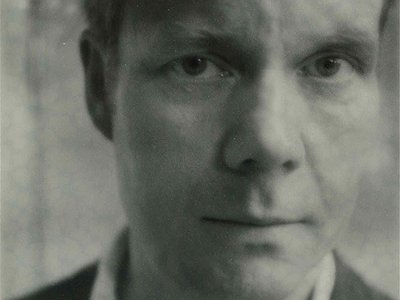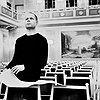Part 1: Childish thoughts
Max Richter's potent distillations of classical tradition, minimal electronica, and the spoken word deliver a listening experience that intentionally levels the field between composer and audience; promoting an open and easy musical conversation without sacrificing depth or emotional resonance in the exchange. His work with film luminaries such as Martin Scorsese and Ari Folman along with the undoubtedly countless mixtapes that have featured tracks from any one of his six studio albums has brought about a slow burn on the collective consciousness. The British composer’s inclusive and undemanding approach to composition has not only given rise to an almost telepathic exchange between himself and the musicians he works with, it has more importantly, invited a wider audience into the once cloistered halls of contemporary composition.
Name: Max Richter
Nationality: German
Occupation: Composer, producer
Current release: Max Richter's SLEEP: Tranquility Base is out via Deutsche Grammophon. It features, among others, Clarice Jensen, Yuki Numata, and Caleb Burhans. Pieces from the album have also been remixed by Alva Noto and Kelly Lee Owens.
Recommendations: Number one would have to be the new Autechre album ‘Exai’ which came out a few weeks ago. They remain a super interesting group and I am always excited about a new album by these guys. They’re very well known so they don’t need any help from me but do go and check it out.
The second recommendation is Nadia Sirota’s new album entitled Baroque which has just been released by the Bedroom Community label. She’s a violinist who works a lot with that whole Bedroom Community crowd, you know, people like Nico Muhly. She’s a great player and a very interesting person as well.
[Read our Clarice Jensen interview]
[Read our Alva Noto interview]
If you enjoyed this Max Richter interview and would like to stay up to date with his music, visit his official website. He is also on Instagram, and twitter. For more reading, we recommend our expansive article on Max Richter's New Four Seasons release.
When did you start composing - and what or who were your early passions and influences?
I started composing before I knew what composing was. As a kid of five or six, I always had tunes going around in my head that I was sort of reconfiguring, almost like a child playing with Lego. I was always doing it but didn’t realise that it was something called composing. It was almost a subconscious thing that I became aware I’d been doing, much later on.
In terms of influences I suppose it was things that everyone is influenced by when they’re little, you know the classics. The Beatles and in the classical domain, Bach. Those were my starting points, the twin stars.
What do you personally consider to be incisive moments in your work and/or career?
The first one would have to be going to study with Luciano Berio in Italy. This was a big deal for me because he was such a brilliant musical thinker. I had not really encountered anyone like him before.
When I showed him a score of mine once, it felt as though he was reading my mind, which is a bit scary because he managed to see what was on the page but also what I meant when I wrote it. Maybe I was succeeding or failing but he could read the intention behind all of my scribbles, which was amazing.
The second would have to be when I started to do my own records. Having already done a lot of composing, playing as a performer and other things like that, recording Memoryhouse and The Blue Notebooks, were major turning points for me.
What are currently your main compositional challenges?
I don’t know really. Composing for me is a bit like an obsessive compulsive disorder in that I do it all the time.
The main challenge would simply be remaining true to the material and following it wherever it wants to go, something like an archeological process of discovery. I always try and remain open to what the material can do.
What do you usually start with when composing?
Music for me is story telling, so I usually start with an intention or something I want to say. From there I kind of struggle around in the dark, trying to find ways to say that. Sometimes it’s a linear thing where I have an idea and then go about trying to find ways to express it. Other times I will discover things along the way and the idea ends up turning into something else altogether. It’s a mixture between intention and chance.
I think the reason I write music is because I’m trying to say things that I find difficult to encapsulate verbally. Music is its own kind of language and it’s very good at saying things that words struggle with, so that’s often the impulse for me.
How do you see the relationship between timbre and composition?
They are two sides of the same coin really. There has always been a tug of war between colour and text or notes against orchestration in traditional music.
A good example of this would be when you think of Debussy. With him, it’s all about the colours but actually underneath all of that colour there are these fantastic notes. Debussy’s incredible if you play it on a piano but it’s equally as brilliant if you go and play it on any other instrument because the notes are so great in the first place.
Then of course there are other kinds of music like electronica, which to some extent is all about colour and hardly about the notes at all. It tends to be more about textures as opposed to melody or harmony.
A lot of dance music for example, is about minute gradations over long spans of time; cyclical things that evolve slowly. So some things are all about colour and they’ll live in the synthesisers or in the computer. Other kinds of music are more about how the notes interact and they’re the sorts of things I would write down on paper or work out on the piano.
I think it just depends on what the project is. Each piece has its own point on that spectrum of timbre versus composition.
What do improvisation and composition mean to you and what, to you, are their respective merits?
I do a lot of my composing at the piano and I sort of just let my hands walk around on the keyboard. It’s a process of happy accidents really; a mixture of random discoveries that go with a strategic kind of compositional planning. Those two things go hand in hand.
Music is a physical process. The way you play something has to make sense physically. It’s a way of thinking aloud but the text also has to make sense, so for me composition and improvisation are connected.
Do you feel it important that an audience is able to deduct the processes and ideas behind a work purely on the basis of the music? If so, how do you make them transparent?
What I’m trying to do is get things down as simply and with as much intensity as I can, that’s also why I write, because I’ll have that impulse. I don’t want things to be obscure. In fact I want it all to be very straightforward. I don’t want to keep people out. It’s a conversation and I want people to be able to take part in it.
We imprint our biography on what we come to and music is no different in that sense. Every listener will bring his or her own way in and that’s what’s kind of nice about it actually. It’s what makes it more like a conversation.
The relationship between music and other forms of art – such as painting, video art and cinema - has become increasingly important. How do you see this relationship yourself and in how far, do you feel, does music relate to other senses than hearing alone?
Music is one of the dominant ways of experiencing being alive and so in a way, it’s more than just hearing. It’s about articulating feelings, stories and attitudes. I also feel as though an album or a piece of music almost has a sense of place inside it if it’s good. It takes a lot out of you to really apprehend music fully so I think it does relate to the other senses.
In terms of how music relates to other forms of media, there are a million possible connections between these things. I’ve done quite a bit of film music and the multitude of ways in which sound can connect to stories and visuals is always really interesting. Film music is solving puzzles mostly. It’s a technical discipline and I find it a completely different thing to writing music on its own.
In my case, when I’m writing just music, I’m trying to give the absolute total picture or the maximum intensity of that idea to the listener. If you did that in the cinema, you wouldn’t have a film. It would be as though you’ve gone to a cinema just to hear a record playing [laughs].






